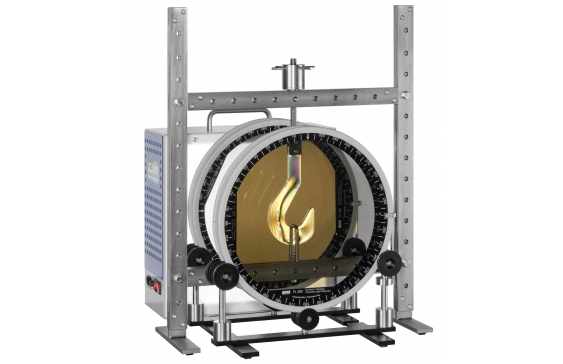FL 200 Photoelastic experiments with a transmission polariscope

Photoelasticity is a proven method of analysing and recording mechanical stresses and strains in components. It is used both for quantitative measurements and for demonstrating complex stress states. The components used are models made of a transparent, photoelastically sensitive plastic, which becomes optically birefringent under mechanical load.
FL 200 is used to conduct photoelastic experiments on plane, transparent plastic models. The models are subjected to load by external forces, and they are radiated by circular polarised light. An analyser analyses the light penetrating the body.
The experimental setup comprises the separate components: a light source, two linear polarising filters (polariser and analyser), two quarter-wave filters and a frame in which the models are attached and subjected to load. The light source optionally permits coloured stress patterns with white light or a light/dark representation with monochromatic light.
The polariser includes a polarising filter and a quarter-wave plate and generates circular polarised light. Behind the model is a second quarter-wave plate (perpendicular to the first one), which is combined with a second polarising filter. These form the analyser. The filters are mounted on rotating bearings and fitted with angle scales.
Various polycarbonate models are mounted inside the frame. A load application device applies bending, tensile or compressive load to the model through a spindle. Stresses and strains occurring in the model are identifiable as bright spots, visualising the distribution of stress. The order of the dark isochromats is analysed to determine the principal stress differential.
A wide selection of models such as notched bars, a wrench and a model-roller bearing or a rack-and-pinion is available as accessories. These ensure the implementation of comprehensive experiments. It is also possible to investigate your own models.
- monochromatic or white light
- generate stress patterns with linear or circular polarised light
- models for specific problems can be prepared by the user
Light source
- lamp box with white diffuser
- for white light
- 1 fluorescent tube TL-E 32W/33 (colour: 33)
- 2 incandescent bulbs, candle lamp, frosted E14, 230V, 25W
- for monochromatic light (yellow)
- 1 sodium vapour lamp SOX 35, 35W
Filter, mounted in glass, diameter: Ø 425mm
- 2 polarising filters (dark olive)
- 2 quarter-wave filters (uncoloured)
Frame: WxH: 600x750mm
230V, 50Hz, 1 phase
230V, 60Hz, 1 phase; 120V, 60Hz, 1 phase
UL/CSA optional
- produce the mechanical stress curves through photoelastic experiments
- 2 linear polarising filters (polariser and analyser)
- 2 quarter-wave filters for generating circular polarised light
- all filters have 360° angle scale and indicate the main optical axis
- filters mounted on roller bearings and can be pivoted
- white light produced by a fluorescent tube and two incandescent bulbs
- monochromatic light (yellow) generated by sodium vapour lamp
- frame cross-members can be vertically adjusted
- pressure or tensile forces generated by a threaded spindle
- finished polycarbonate (PC) models available as accessories for the demonstration
together with the accessories or your own models:
- generate plane stress states in various models under load: bending, tensile load and compressive load
- investigate stress distributions with linear or circular polarised light
- interpret photoelastic fringe patterns: stress concentrations, zero points, neutral strands, areas of constant stress and stress gradients
- graphically and computationally determine the stresses
